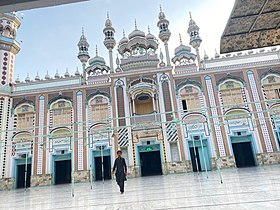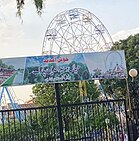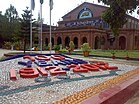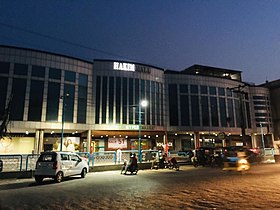Mandi Bahauddin
Mandi Bahauddin
منڈی بہاولدین | |
|---|---|
Clockwise from top: Jamia Masjid Ghausia Rizvia, University of Engineering & Technology, Rasul, Rasul Barrage, Hakim Mall, Jhelum River, Mian Waheed Ud Din Park | |
| Nickname: منڈی آلے | |
| Coordinates: 32°34′47″N 73°28′53″E / 32.57972°N 73.48139°E | |
| Country | |
| Province | |
| Division | Gujrat |
| District | Mandi Bahauddin |
| Established | 1506 AD |
| NA/PP | 2/5 N.A (85,86) P.P(65,66,67,68) |
| No. of Towns | List
|
| Government | |
| • Type | Municipal Committee |
| • Union Councils | 27 |
| Elevation | 204 m (669 ft) |
| Population | |
• Total | 198,609 |
| • Rank | 41st, Pakistan |
| Demonym | Mandi Aala |
| Time zone | UTC+5 (PST) |
| Postal code | 50400 |
| Dialling code | 0546 |
| Website | www |
Mandi Bahauddin (Punjabi: منڈی بہاؤالدین) is a city in Punjab, Pakistan. It is also the capital of Mandi Bahauddin District. It is the 41st most populous city in Pakistan, according to the 2017 census. The city is about 220 metres above sea level and is located between the rivers Jhelum (north 12 km) and Chenab (south 39 km).
The name of the town originates from two sources, Mandi was a prefix because it was a grain market and Bahauddin was a Sufi saint.[3] It is also known as the city of Lions.[4]
History
[edit]Foundation of Mandi Bhauddin
[edit]In 1506 C.E. a Gondal tribal Chief named Bahauddin established a settlement namely Pindi Bahauddin, after his migration from Pindi Shahjahanian to this area.[3] The town started growing in early 20th century near the ancient village named as Chak No.51, where Sikh, Hindu and Muslim businessmen and land owners came to settle. John Alam made the map of this chak, which became the center of this new town Pindi Bahauddin. later in 1920 because of famous grain market setup in this Chak No. 51, it was given name of Mandi-Bahauddin, in 1923 all the streets and roads were laid straight and wide. In 1924 Pindi-Bahauddin Railway station was given the name of Mandi Bahauddin railway station. In 1937 when Mandi-Bahauddin was town, it was given the status of a town committee and in 1941 it got the status of a Municipal Committee. In the master plan of reconstructing this town. In 1946, nine gates and the walls were retied around this town.[5]
Early history
[edit]The recorded history of Mandi Bahauddin goes back to the era of Alexander the Great. Some 8 km northwest of the modern-day Mandi Bahauddin town, at the village Mong on the southern bank of the Jhelum River (Greek Hydaspes), the battle Battle of the Hydaspes River was fought between Raja Porus (Sanskrit Paurava) and (The Great Tribe Chadhar) and Alexander. This historic battle of Jhelum River took place in 326 BCE.[6] The kingdom of Raja Porus was situated in the northern Punjab of modern Pakistan. This was the last major fight of Alexander's career; the Macedonians, after finding a fierce resistance by Porus, and having heard of a massive 4,000 elephant force mustered by eastern kingdoms, refused to march further toward the Ganges Plains. The Sadar Gate built during the British era in 1933 is present here.[7]
Administration
[edit]Mandi Bahauddin, the capital of the district, is also the Tehsil headquarters. Mandi Bahauddin was raised to the level of Municipal Committee in 1941. It was given the status of Municipal Committee after the implementation of Punjab Local Government Ordinance 2001. Municipal Committee of Mandi Bahauddin Tehsil is subdivided into three tehsils and eighty Union Councils:[8]
| Name of Tehsil | Number of Union Councils[8] |
|---|---|
| Malakwal | 20 |
| Mandi Bahauddin | 30 |
| Phalia | 30 |
| Total | 80 |
Demographics
[edit]As per the 1998 Census of Pakistan, the population of city was recorded as 99,496 while at the 2017 Census, the population of city had risen to 198,609 with an increase of over 99.62% in 19 years.[1][9]
| Religious group |
1941[10]: 32 | 2017[11] | ||
|---|---|---|---|---|
| Pop. | % | Pop. | % | |
| Hinduism |
6,146[b] | 48.2% | 86 | 0.04% |
| Sikhism |
4,277 | 33.54% | — | — |
| Islam |
2,268 | 17.79% | 214,722 | 98.84% |
| Christianity |
61 | 0.48% | 2,191 | 1.01% |
| Ahmadiyya |
— | — | 214 | 0.1% |
| Others | 0 | 0% | 19 | 0.01% |
| Total population | 12,752 | 100% | 217,232 | 100% |
Geography
[edit]The district forms a central portion of the Chaj Doab lying between the Jhelum and Chenab rivers. It lies from 30° 8' to 32° 40' N and 73° 36' to 73° 37' E. The tehsil headquarters towns of Phalia and Malikwal are 22.5 and 28.5 kilometres (14.0 and 17.7 mi) from Mandi Bahauddin, respectively. It is bounded on the north by the Jhelum river, which separates it from Jehlam district; on the west by Sargodha district; on the south by the river Chenab (which separates it from the Gujranwala and Hafizabad districts); and on the east by Gujrat district. The total area of the district is 2,673 square kilometres (1,032 sq mi). The district comprises the Mandi Bahauddin, Phalia Tehsil, and Malikwal Tehsils.[3]
Climate
[edit]This district has a moderate climate, hot in summer and cold in winter. During the peak of summer, the temperature may rise to 48 °C (118 °F) during the day, but in the winter months, the minimum temperature may fall below 3 °C (37 °F). The average rainfall in the district is 388 millimetres (15.3 in) and mainly resonates with the weather in Islamabad.[12]
Languages
[edit]The main languages of the district are: Punjabi, the first language[13] of 97% of the population; Urdu – 2.5%, Pashto 0.5% and Saraiki 0.5%[14]
Economy
[edit]Shahtaj Sugar Mills is one of the largest sugar plants in Pakistan. It is located about 2 km west of the city.[15]
Transport
[edit]- Road-Links: Mandi Bahauddin District has road links with the Lahore–Islamabad Motorway (Salam & Bhera Interchanges), Gujranwala District, Hafizabad, Gujrat, Jhelum, and Sargodha. These inter-district roads are maintained by the Provincial Highways Department.
- Railways: From Lalamusa the standard-gauge railway line to the west of the Punjab serves Mandi Bahauddin District with stations at Chak Sher Muhammad railway station, Chillianwala, Mandi Bahauddin, and Ahla onwards to Malakwal
- Helipad: A facility of Helipad used for VVIP movements is also available at city Mandi Bahauddin maintained by Pakistan Rangers, Mandi Bahauddin.[16]
Educational institutions
[edit]Schools in the city include,
Medical facilities
[edit]
Tourism
[edit]
- Gurudwara Bhai Bannu at Mangat, Distt Mandi Bahauddin[19]
- Mian Waheed-Uddin Park[20]
- Canal View Public Park[21]
Notes
[edit]- ^ 1941: Data for the entirety of the town of Mandi Bahauddin, which included Mandi Bahauddin Municipality.[10]: 32
- ^ Including Ad-Dharmis
References
[edit]- ^ a b "Ten major cities' population up by 74pc (from 1998 to 2017)". Pakistan Today (newspaper). Associated Press of Pakistan. 29 August 2017. Retrieved 30 July 2021.
- ^ "MANDI BAHAUDDIN DISTRICT AT A GLANCE". Census.gov.pk website. 25 September 2011. Archived from the original on 27 December 2012. Retrieved 30 July 2021.
- ^ a b c "District overview". District Police office Mandi Bahauddin website. Retrieved 30 July 2021.
- ^ "Mandi Bahauddin". Trekking in Pakistan website. Retrieved 1 March 2023.
- ^ "History of Pindi-Bahauddin (known as Purrani Pindi)". Mandi Bahauddin.com website. 6 January 2009. Archived from the original on 16 May 2012. Retrieved 30 July 2021.
- ^ Kaushik Roy, India's historic battles: from Alexander the great to Kargil, Delhi: Permanent Black, 2004, p. 11
- ^ Ruth Sheppard, Alexander the Great at War: His Army – His Battles – His Enemies, Oxford: Osprey Publishing, 2008, p. 206
- ^ a b "Tehsils & Unions in the District of Mandi Bahauddin". 2 August 2007. Archived from the original on 22 April 2021. Retrieved 30 July 2021.
- ^ "DISTRICT WISE CENSUS RESULTS CENSUS 2017" (PDF). pbscensus.gov.pk. Archived from the original (PDF) on 29 August 2017. Retrieved 30 July 2021.
- ^ a b "CENSUS OF INDIA, 1941 VOLUME VI PUNJAB". Retrieved 9 January 2024.
- ^ "Final Results (Census-2017)". Retrieved 27 January 2024.
- ^ "Average Rainfall & Temperature in Mandi Bahauddin". World Weather Online website. Retrieved 30 July 2021.
- ^ "Mother tongue": defined as the language of communication between parents and children, but still everyone can speak Urdu language easily.
- ^ 1998 District Census report of Mandi Bahauddin. Census publication. Vol. 117. Islamabad: Population Census Organization, Statistics Division, Government of Pakistan. 2000.
- ^ "Welcome to Shahtaj Sugar Mills". Shahtaj Sugar Mills Limited.
- ^ "Mandi Bahauddin District Information". Mandi Bahauddin.net. 27 March 2007. Archived from the original on 22 October 2021. Retrieved 30 July 2021.
- ^ Government of Punjab. "Medical Departments". DHQ Hospital Mandi Bahauddin.
- ^ "Govt Children Hospital". Cybo.
- ^ "Gurudwara Bhai Bannu at Mangat, District Mandi Bahauddin". World Gurudwaras website. Retrieved 30 July 2021.
- ^ "Mian Waheed-ud-Din Park (منڈی بهاؤالدین)". wikimapia.org.
- ^ "Renovation and Rehabilitation of Canal View Public Park Mandi Bahauddin". Echo News website. 10 September 2020. Retrieved 30 July 2021.









